Haysponsor
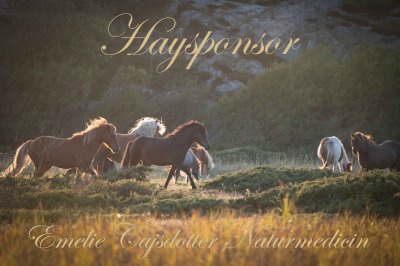
Since 1997, Friskeröd Farm has been run based on a wish to create a sanctuary for individuals of all species, who for various reasons have not been able to adopt to systems based on subordination. These may be animals that are considered diffucult to handle, or individuals who have been traumatized by past experiences. It can also be about physical injuries that have not had time or opportunity to heal.
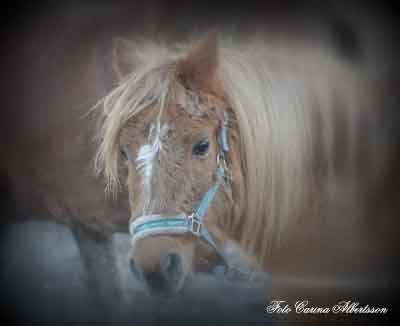
It all begun with the pony Pyret ("the tiny one"), who was the opposite to a people pleaser. We met at a riding school in Gothenburg when she was five, and I was eleven years old. This was a large riding school, which at the time was run in an almost mechanical way. The horses were worn out and broken down as on a regular basis.
Pyret however, was different. She was furious and fought to preserve her integrity. Her strength both frightened and fascinated me. At one point I was standing outside her stall. I didn´t dare to go in, as I knew she both bit and kicked people. Sometimes she wouldn´t even let them out again. So we just stood there, looking at each other. I have no idea how it happened. But suddenly it was as if the invisible wall that defined us in relation to one another was removed. I could experience her entire reality from within - and she did the same with me. It was mindblowing and terrifying at the samt time. There was no fixed reality to relate to, no immediate startingpoint. Everything fell apart. I have no idea how long this went on for. Time did not exsist in this place. And afterwards nothing was the same. The double swinging doors that had flung opened could not be properly closed. At any moment, and without warning, this could happen again. The definable self no longer included only myself. This was not the same as a projection. I didn´t believe I was Pyret. We could still distinguish each other - but at the same time we fully shared each other´s experiences. Perhaps there is no need for explanations, or translations, if emphathy is the bridge between. Thus the isolation dissolves. Words are the descriptions we need to reach each other, as long as there is a distance.
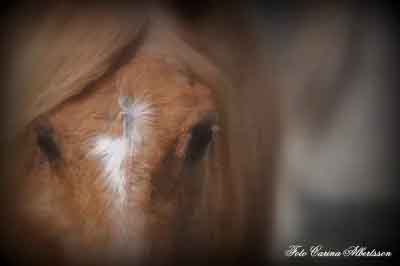
After a number of years at the riding school, Pyret became seriously ill. She developed a lung disease called emphysema, or chronic obstructive pulmonary disease (COPD in humans). As there is no cure for this disease, plans were made to put her down. She was eight years old at the time, and I was completely devastated. Every since the day we met, I had been her groom, which was no easy task. She was biting, kicking and testing my patience as much as she did everyone else´s. But I couldn´t give up. My grandmother realized the seriousness of the situation and decided to buy Pyret. With her help, we were then able to leave the riding school and Pyret could move to a farm in the country side. I was overjoyed and thought that from now on all the problems would be solved. But as it turned out, it really wasn´t that simple. Pyret´s path in life was not primarily about getting well, but about becoming completely free. I was driven by fear of losing her, while she was motivated solely by the longing to become fully alive. To be able to follow her on this path, I had to let her go. Not just in relation that particular fear, but in relation to everything; to every limiting bond. My whole identity, everything I had thought and done so far, and everything I knew to be true.
Sometimes I think that we humans surround ourselves with domesticated animals because we need their unconditional love. We have such a great need to be seen and confirmed. But for that to happen, we must also be prepared to see ourselves, without any illusions. It requires a deep and honest self-examination. The animals around us must be given space to fully become who they truly are, both on a personal level and in terms of the natural needs of the species. Otherwise there can never be a genuine meeting on equal terms. We have so many methods to get animals to listen, obey and follow us. But all too rarely the opposite occurs.
" If you have come here to help me you are wasting your time. But if you have come because your liberation is bound up with mine, then let us work together"
Lilla Watson
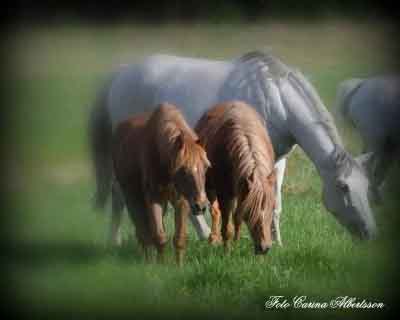
Pyret wasn´t going to compromise. If I wished to follow her path, it was entirely up to me. Her healing process had only just begun. And as the external stress subsided, all symptoms flared up. The arrested breathing and caughing worsened significantly. Her vital force had been raised. The space, both inside and out, had increased - and all that had previously been suppressed, now rose to the surface. It was a long and winding road, but in the end it brought us to the place where we are now. At first, she did not respond to any treatments, neither conventional nor alternative. This was not an isolated problem that could easily be removed or fixed. The healing process had to be continued from the place where it once started.
In the dissolution of the ego and the individual identity. Towards the expansions of the self to ultimately include everything. And towards the individual´s longing to dare to live fully. In this process it also became clear that all forms of subordination as well, as any kind of hierarchal structures, which we humans so often assume, would constitute an impossible limitation. If everything is ultimately one, there can be no such distinctions. And no empathetic communication would be possible if there was any kind of difference in value. One of my human teachers, Marion Rosen, once explained that you can never heal someone else.The only thing you can do is to help maintaining a space where others are given the oppurtunity to fully become who they are. This is the basis of any individual healing process, as well as the foundation of all the work we do here.
Pyret showed the way, and over time it also became possible to allow space for more individuals of different species to undergo similar healing processes. The goal is not, and never has been, to re-adapt, sell on or relocate any of the animals that come here. For that reason, we only accept animals that have no chance of recovery, nor the possibility to be rehabilitated where they are. Almost all the animals on this farm would have been euthanized if they hadn´t been given opportunity to come here. For a large part of these animals, their previous problems are based on the fact that they have not been able to renounce their natural instincts, in order to adapt to the needs of humans. Many of them have a history of abuse and neglect. For others, what is considered normal training and handling has led to excruciating trauma. From a treatment point of view, one must then ask whether it is the individual who is unbalanced, or whether it is a system error? And if it is to some extent a matter of system failure, then there is also an obvious conflict between recovery and rehabilitation.
Pyret eventually recovered from her chronic pulmonary emphysema, against all odds. And she then devoted the rest of her life to free herself from everything that previously bound her identity. When she finally left her body, at the age of thirty-five, she was completely free. She was lying down in one of the largest pastures, late in the fall. Her red chestnut colour blended with the grass and the falling leaves. During her time at the riding school, she had been confined ten months a year. There were no outdoor paddocks, and the stables were built directly adjacent to the indoor arena. The horses barely saw any daylight, except during the occasional hack outside. But for two months of the year, all the horses were let out to graze. And in that period Pyret was impossible to catch. When autum came, it happened that she was left alone in the pasture, long after the all the other horses had left. Until they finally surrounded her and forced her to go onto the trailer. She kept wishing that people would forget about the horses in the fall, so that they could remain in the big pasture all year around. Now it was autumn, just like then, and the whole herd roamed freely around her. It consisted of as many horses - about sixty - as there had been at the riding school at that time. Pyret was completely contended. Everything she had fought for in life, she has now achieved. There was nothing left to do. Her dream had come true. I had always thought it was my vision, and my conscience about all those left behind. But it was Pyret - this stubborn, furious little horse - who had made all this possible. Because anyone would naturally undertand that you can´t save everyone, right? Of course you can´t... But you can still do a lot; for very, many individuals. When Pyret let go, in her very last breath, she became one with everything. It was as if all the stories dissolved. Like thousands of little flakes of life force, which passed into each one of us, who were with her at that moment. And so her dream lives on, undiminished.
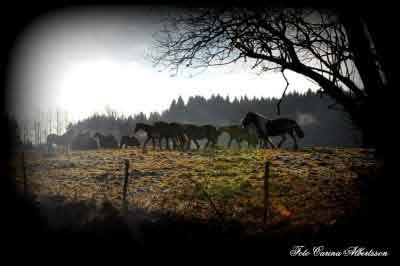
A basic prerequisite for creating space for this kind of spirutual healing is that there is no profit motive. There can be no goals whatsoever. Any idea of personal, isolated gain would directly counteract a coexistence based on trust. All work with the animals on the farm is voluntary. The expences are mainly covered by the work that takes place outside the farm; such as conversations with animals, training of horses and other animals according to non-hierarchical principles, and alternative treatments. Much of the work involves treating animals suffering from post-traumatic stress, or other behavioral symptoms. We do not see ourselves as owners of any of these animals, nor of the land or any of its inhabitants. We are merely caretakers of the site, and the land where the animals are grazing, together with every other living being. We are responsible for their well-being. But we expect nothing in return. Non of this is done for any purpose other than the fact that it is possible.
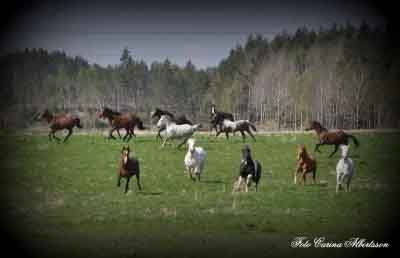
Over the years, many people have wondered if there is a way to contribute and help in any way. Initially, we were reluctant to receive any kind of charity, not least because of the need to protect the integirty of the individuals. The economy of the farm had so far been based on an idea of complete trust, which has worked out in a fascinating and often unexpected way. At the same time, it feels relevant to be able to involve more people in this work, and therefore we designed a system of hay-sponsors. The hay-sponsors have been in place since 2013, and during this time their help has made a huge difference to the whole place. And this has become even more evident now that the prices of feed, among other things, have increased drastically. We would not have been able to expend and even carry on without these remarkable people. We are extremely grateful for all these amazing efforts!
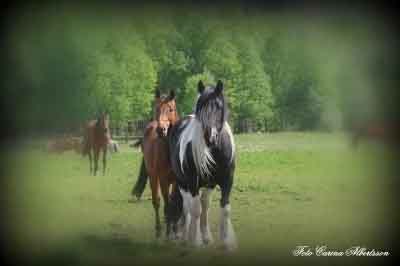
A hay-sponsor contributes a small amount of money every month (or at any suitable interval), thus supporting the organisation and its basic idea as a whole. You do not sponsor a single individual. This feels important, partly to avoid unnecessary exposure and thus protect the individual´s integrity. But it´s also important to emphasize that the activities at Friskeröd are primarily about developing a non-hierarchical interbeing between different species and individuals, as well as between humans and the surrounding nature. As a sponsor, you recieve a monthly letter where you can follow in detail the in-depth work with the animals on he farm. Each letter is between 10-15 pages long, with photos. An extra midsummer appendix and a Christmas greeting are also sent out every year. As a new sponsor, you receive three letters per month until you are up to date, so you don´t miss any previous letters. Due to a heavy workload, we have limited oppurtunities to follow up telephone and email contacts. But we do read everything that comes in. So far we have had few possibilities to recieve visitors, individually or in groups such as open house. This might change a little in the future, with the creation of a new foundation protecting an even larger are of land. Updates on this amazing project will be posted here, as well on the website www.friendsofmio.com
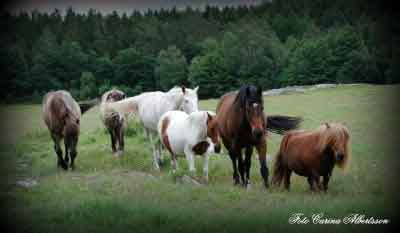
As this non-profit organisation grows, changes and develops, new ways for people and other species to meet are opening up. This has also resulted in a collaboration that we have chosen to call "Friends of Friskeröd". Here you can participate and contribute with more practical efforts regarding the everyday care of the site and the animals. For example: cleaning, grooming, helping with rehabilitation, repairing buildings, mending fences, trimming hooves,moving the horses between pastures and so on.. If you are interested in contributing in this way, please contact us by e-mail, the same as you register as a hay-sponsor:
[email protected]
In the email, please tell us briefly about yourself and what you can contribute with. We will then contact you when needs and opportunities arise. Friends of Friskeröd is organized via the Timetree app, which you then will have access to.
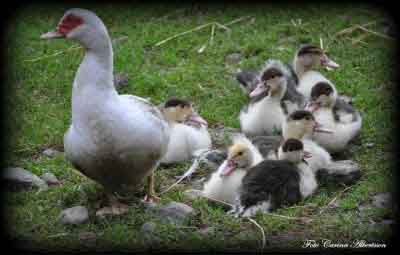
We are also planning an extended collaboration with the Gerlesborg Theatre Studio. The work with performing arts, horses and other species has proven to be very rewarding. "The Barn Lab" is an experiment where volunteer work is mixed with physical exercises, designed by all different kind of species. More information about this collaboration will be available at www.scenkonstgerlesborg.se
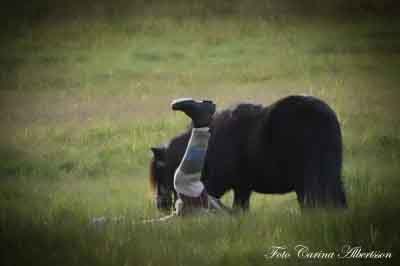
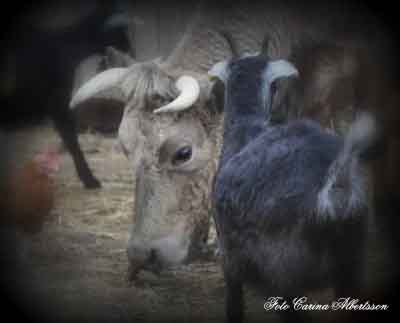
In total, more than 200 animals live on the farm: horses, cows, pigs, sheep, goats, ducks, chickens, guineapigs, cats and dogs. The horses are the largest group, since 2016 we have a license from the county administrative board to keep up to 65 horses.
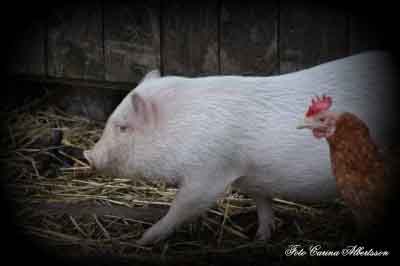
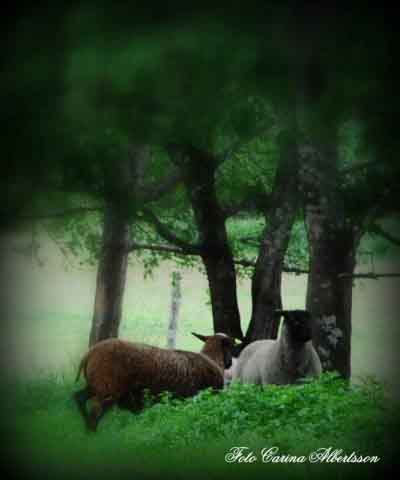
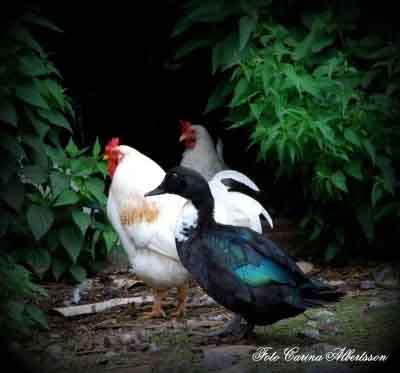
Ducks and chickens are the second most numerous animal species. The bill for hay is undoubtedly a major expense of the farm, since all grazing animals (horses, cows, sheep and goats) have free access to hay/hay silage in the winter season. Along with straw and extra feed supplements. However, sponsoring this expenditure also opens up resources fot other necessary investments, such as the construction and maintenance of pens, graveled feeding areas, fences, etc. It also help to liberate time. Time that can be spent with the animals that live here. Both in practical exercises and in-depht rehabilitation. But also in terms of dialouge. Time to listen - and to wait - so that new ideas and insights may emerge.
"There is a voice that doesn´t use words. Listen. "
Rumi
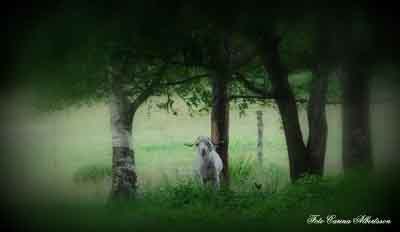
We live in a time when performance, results and success are largely valued. But you rarely hear animals, plants and other life forms communicate about these things. Their focus seems to be more about achieving a higher level of presence. Many convey the importance of helping to change/expand human consciousness. We are a young species, still searching for our place in a larger context. Other species often describe us as more seperate, or even isolated. It´s as if we are surrounded by oblivion, like a void. In this vacuum, a self-centeredness emerges. It´s as if we have not yet made up our minds. Are we singular beings, surviving through mutual competition? Or do we dare to step into the unknown and surrender to something greater?
We seem to be the only species that consciously choose destructive behavior in realation to the whole. We need all the help we can get. Both in terms of our own and other species´ survival. But also in order to help reduce the suffering created in the wake of greed, isolated gain, and our seemingly insatiable need for affirmation. A counterforce to all this is the development of our emphatic capacity. This requires persistent and long-term practice. One way to help inspire this is through the stories that the animals share in the hay-sponsor letters. In this way, a hay-sponsor contributes not only with much appreciated and necessary help, but also with their ability to listen. We didn´t want to set any financial guidelines, to emphasize the idea of volunteerism. But we also realized that it can be good to have a starting point. Therefore, the basic idea is that a hay-sponsor contributes 100 SEK per month, more or less depending on what you feel is reasonable in the context. You can choose to pay monthly, annually or at any time that suits you best.
All donations are made to bangiro number 431 - 3284, and label the payment Hay-sponsor. For international payments the details are as follows. Iban: SE75500000000111050189, Bic: ESSESESSXXX, Address: SEB, 106 40 Stockholm. We are also in the process of setting up a PayPal account. Deposited money goes in full to the hay farmer and is accounted as a gift. It´s therefore important that the payment is labelled "hay-sponsor". If there is room to cover other expences, this may also include straw, supplementary feed such as alfalfa and hay pellets, veterinary costs, certain equipment, horseblankets, or necessary repairs. Depending on your resources, a hay sponsor can also provide volunteer help, through "Friends of Friskeröd" as described above. You can register as a hay-sponsor by emailing your contact details to: [email protected]
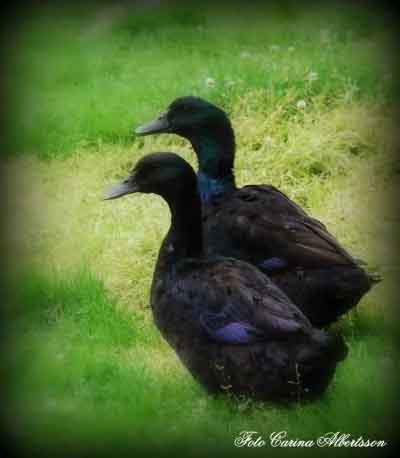
Freedom and natural conditions
The horse herd currently consists of 65 individuals. During the winter months they are divided into two herds of roughly equal size. This is because the land is not sufficient to accommodate all individuals in the same paddock during thawing and other wetter periods. The winter enclosures are five to seven hectares in size. Each pen has at least five feeding areas on graveled, hard surfaces, and six outdoor stables with permanent bedding. One group shares a winter pasture with four cows, and the other with sheep and goats. All grazing animals have free access to hay/silage. Individuals that have special needs of various kinds are fed seperately with different kinds of supplementary feed.
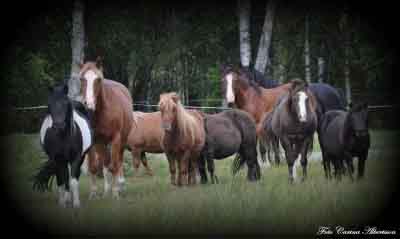
During the summer season, the horses have access to an additional 100 hectares of leased pasture, divided into pastures of 3 - 30 hectares. Depending on pasture growth and individual needs, the herds are then regrouped. Grazing planning is handled by a responsible horse, currently the mare Celeste is in charge of this task.
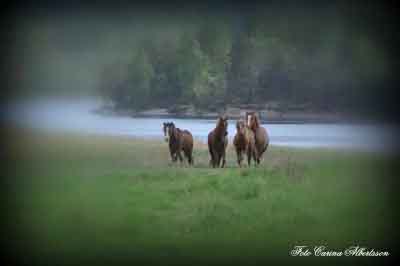
Horses are moved between pastures by being ridden or led, as many of them have deep traumas associated with transportation. The horses that have come here have done so because, for various reasons, they had nowhere else to go. The vast majority would have been euthanized. We have not selected horses of a certain breed, age or type. At the time of writing, the age ranges from two to thirtyfour years, and the height at the withers from 81 to over 180 cm. Through the unique opportunity to study these flocks up close, we learn a lot. Not only about horses´ behavior and ability to coexist, but also about ourselves as humans. One of the most fundamantal observations in this context has been that horses (and other herd animals) do not seem to relate to a specific leader, or even a ranking order in the sense we often assume. Instead, they describe a completely different structure, where the foundation of the herd is based on all individuals using their maximum capacity at the right time. Such a system requires that you to get to know yourself, deep down to the very core of your essence. It´s about finding your own basic character, role and specific competences in relation to all the other memebers of the herd - and thus finding your place in a larger context. It´s not about ruling over someone else. The idea of ranking assumes that number one is slightly better than everyone else - in all areas. Number two is the next best, and so on, down to the weakest individual, whose role is to be some kind of weakling. The concept of pecking order comes from an experiment with chickens confined to a small area with limited access to food. At that time, it was concluded that a hierarchical power order, only arises if the individual is deprived of the opportunity to live out their natural instincts. It´s therefore not a natural state of being, but rather the opposite. Yet we have chosen to see an oppressive pecking order as a natural law. This also mean that, in virtually all manegement of horses, dogs and other herd animals, we tend to start from an idea of order of power. We assume that we must be the animal´s leader in order for any co-operation to be possible. We also tend to assume that the animal will constantly, more or less, compete with us for this position. Our methods are based on an underlying idea of personal gain. Even though we know from modern research that herd animals survive through the ability to co-operate, not compete.
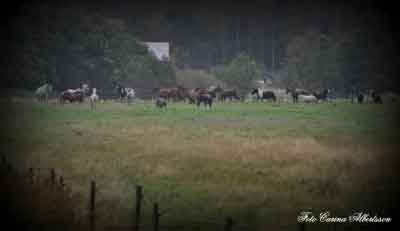
Many years ago, in my work, I asked myself the question: is it necessary to use dominance in the handling of animals? That question became the starting point of a very long journey, which took me several times around the globe. And there was an answer, eventually, largely presented by the Hashemite Arabian horses in Jordan. These horses were very clear in explaining that no, it is not mandatory to use any dominant or manipulative methods when dealing with other species. And yes, there is a way of empathic interbeing, also for humans. Ever since this first meeting and journey to Jordan, there has been an ongoing cooperation between this farm at the Royal stables in Amman. This story is in its nature never-ending, as there are always deeper layers in the timeless teachings of these horses.
The explanation of this kind of interbeing must be experienced. It´s a state of being, rather than a technique. And this requires trust, presence and the ability to step out of linear time.
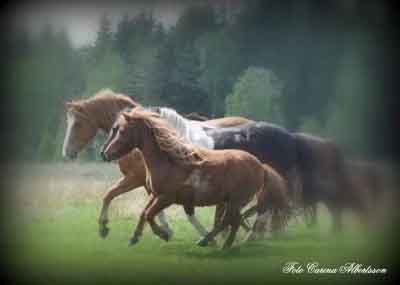
In a herd of horses, all idividuals relate to each other, one by one, but also simultaneously. There is always an awareness of everyone´s experiences, just like in the encounter with Pyret. One does not exclude the other. The self does not only include oneself, but the entirety of the herd as well.
The roles of the herd are largely about maintaining a vital living space, that will provide each individual with resources to develop who they are truly meant to be. Each individual is immediately responsible for their part in this web of life. Joint decisions arise from the experience of all herd members, not because one individual makes a unanimous decision. As humans, we often experience the opposite. We experience one thing at the time. Opposing thoughts and ideas are mutually exclusive, and the self is perceived to be limited. In this loneliness and isolation, we fight for our individual survival. We compete for the resources. Hence our ability to share is limited by the fear of showing vulnerability in an insecure world. This in turn leads to an exploitation of natures resources. Nature is endless in its generosity. There are no limits, other than those we create ourselves. But without an empathic capacity, we lack the ability to understand how our actions affect others. We therefore have no direct experience of the consequences of our actions. Why don´t horses, or other animals, speak up? We assume that they accept our treatment of them, unless they protest in a way we can understand. But the responsibility and respect for the integrity of the other must first and foremost come from an empathic understanding within ourselves.
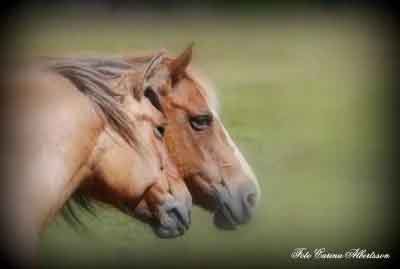
Mio´s principles
One horse, who chose to dedicate his entire life to help changing human consciousness and expanding our emphatic capacity, was Mio.
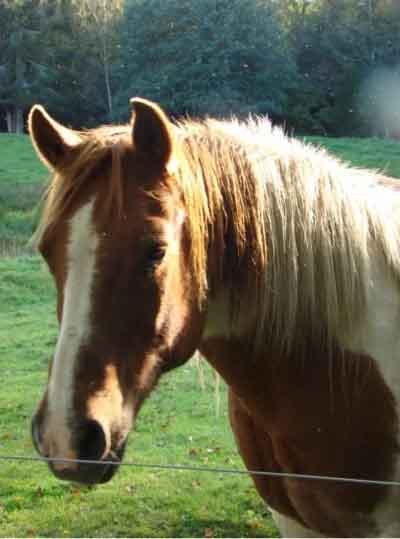
Photo Emelie Cajsdotter
He chose to spend the last ten years of his life with us. And he devoted this time to providing in-depht insights into the training and rehabilitation of both horses and humans, according to non-hierarchical principles. His ideas are based on the principle that herd animals are largely motivated by the drive for peaceful interbeing. Therefore, he uses no coercive or intusive aids. Through very small movements of the pelvis, spine, shoulders and other peripheral joints, the rider provides a flow of energy that facilitates the direction of movement - physically, mentally and emotionally. But for such an interaction to be possible, any barriers to communication between rider and horse must first be removed. A large part of the work lies in examining one´s intentions, fears and habitual patterns. The horse and rider are each other´s mirrors, where the possibility of increasing the individual´s freedom and ability to heal themselves is at the centre of focus. It´s never about getting the other individual to do what you want. The whole idea of - and need for - obedience ceases with the deeper realization that everything is ultimately one and the same.
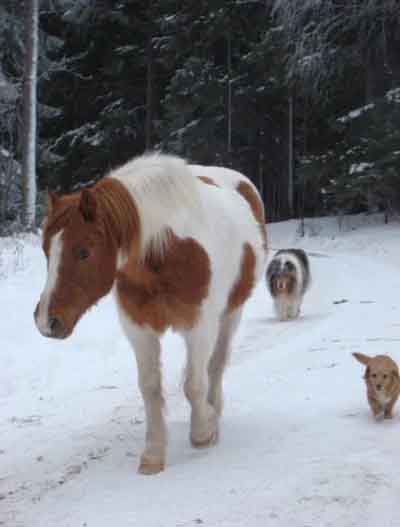
Photo Emelie Cajsdotter
Mio´s ideas form the basis of both the everyday handling of the animals on the farm, as well as the training and rehabilitation of animals that we work with. These principles do not require any special equipment, or specific orientation. It´s more about the ability to surrender and dare to trust that there is something else underneath the immediate surface. Something that is permanent and unconditional; a state of being that is without internal and external resistance.
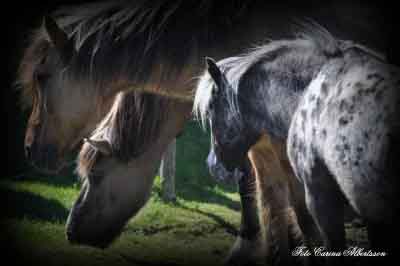
" Out beyond ideas of wrongdoing and rightdoing, there is a field. I will meet you there.
When the souls lies down in the grass, the world is too full to talk about.
Ideas, language, even the phrase each other doesn´t make any sense."
Rumi
In 2018, the first training program in emphatic communication and interbeing, based on Mio,s principles started. This is a two-year course, organized in a number of weekend seminars during the summer months. The course is planned by the horses themselves. The focus is on communication, touch therapies of various kinds, and how to translate Mio´s principles into practical handling, riding and consciousness development. Deep down, it is basically an approach to life itself.
There is also a possiblity to continue extra, in-depth studies of Mio's principles, the teachings of the Hashemite horses and other species after these first basic two years.
Other courses in the Friskeröd Academy, run by other species, is Celeste's course in ground regeneration, grazing planning and the deeper relationship between humans and nature.
We also have Nino's school in hoofcare, a childrens group and studies in herbal medicine.
The horses are also planning two international on site courses in empathic interbeing in 2024. The preliminary dates are: May 5-14 and September 8-17 in Tanumshede, Sweden (about 2 hours drive from Gothenborg).
If you are interested in participating, please send a personal letter to [email protected] where you describe a little bit about yourself and why you are interested in this work. The admission process is done through the horses and other animals. As soon as we know anything more, we will let you know.
Contents of the course, so far:
Day 1. Arriving and settling in from mid-day and on. Spending time just being together with other species. In the evening we gather for a shared meal and storytelling.
Day 2. Different exercises in finding and opening up the self for empathic communication. A walk in nature will be included.
Day 3. We learn more about the concept of non-hierarchal interbeing from different species. The teachings of the Jordanian, Hashemite horses are included in all the work.
Day 4. In order to receive something, we practice giving. This day is free of studies in order to digest what we have experienced so far. The day is spent helping out at the farm, and the duties are guided by what the animals wants us to do for them and the place.
Day 5. Rosen inspired therapy, meeting the essence of the other one. We learn more about how we can help animals suffering from trauma.
Day 6. The basis of riding horses, according to the principle of Mio.
Day 7. A day by the ocean, meeting different species. We visit the nature reserve Tjurepannan where we focus on water and dissolving the concept of linear time.
Day 8. This day we meet and work with plants. We also help out at the farm with whatever is needed.
Day 9. Today we learn more about micro movements and communicating through an enhanced body awareness.
Day 10. Contemplation, practicing gratefulness together with the animals, plants and forest. We finish around lunch time.
Online courses for international students
The horses are also planning an online opportunity to get some insight into the work we are doing here. This includes videos, texts and voice recordings divided into 8 chapters. This is a work in progress and as soon as we know more, the information will be shared on this website.
If you are interested in this, send an email to [email protected]
Friskeröd Academy: Celeste's ground regeneration course
There will be an online version of this course in English during 2024. The dates are: 23/2, 22/3, 3/5, 7/6, 19/7, 6/9, 18/10, 29/11
If you are interested in this, send an email to [email protected]
More information about these courses can be found on the website




























